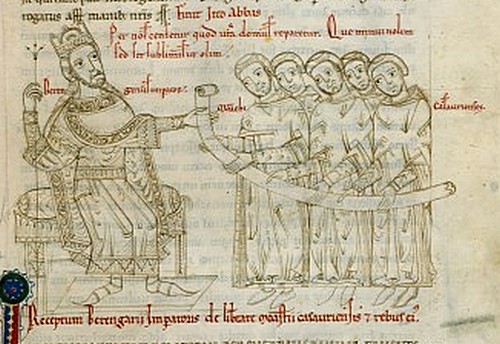
“Non hederam sperare vales laurumve, libelle,
quae largita suis tempora prisca viris.
contulit haec magno labyrinthea fabula Homero
Aeneisque tibi, docte poeta Maro.
atria tunc divum resonabant carmine vatum:
respuet en musam quaeque proseucha tuam;
Pierio flagrabat eis sed munere sanguis:
prosequitur gressum nulla Thalia tuum.
hinc metuo rapidas ex te nigrescere flammas,
auribus ut nitidis vilia verba dabis.”
“quid vanis totiens agitas haec tempora dictis,
carmina quae profers si igne voranda times?
desine; nunc etenim nullus tua carmina curat:
haec faciunt urbi, haec quoque rure viri.
quid tibi praeterea duros tolerasse labores
profuit ac longas accelerasse vias?
endromidos te cura magis victusque fatigat:
hinc fugito nugas, quas memorare paras.”
“irrita saepe mihi cumulas quae murmura, codex,
non poterunt votis addere claustra meis.
seria cuncta cadant, opto, et labor omnis abesto,
dum capiti summo xenia parva dabo.
nonne vides, tacitis abeant ut saecla triumphis,
quos agitat toto orbe colendus homo?
tu licet exustus vacuas solvaris in auras,
pars melior summi scribet amore viri.
supplice sed voto Christum rogitemus ovantes,
quo faveat coeptis patris ab arce meis.
haud moveor plausu populi vel munere circi:
sat mihi pauca viri ponere facta pii.
Christe, poli convexa pio qui numine torques,
da, queat ut famulus farier apta tuus!”
(Gesta Berengarii, prologus)
“Little book of mine, you shouldn’t hope for the ivy and laurels which times of old bestowed upon great men. The labyrinthine Odyssey conferred these gifts on the great Homer, and the Aeneid on you, learned poet Vergil. In those days the emperors’ halls resounded with the songs of poets, but nowadays every shack rejects your verse. The poets’ blood back then was on fire with the inspiration of the muses; today no Thalia follows in your footsteps. I fear therefore that you will soon feed the ravenous flames if you offer your shoddy verse to sophisticated ears.”
“Why do you continue to assail these times with pointless words if you worry that the poems you offer will be devoured by the fire? Stop it; the fact is that nobody now cares for your verse. These days poems are written in the city and in the country. Besides, what good has it done you to suffer those hardships and to hurry down those long roads? Worrying about warm clothing and food exhausts you more, so begone with this rubbish you prepare to relate.”
“This idle prattle you often heap upon me, book of mine, will not be able put my desires in chains. May all serious matters fall aside, that is my wish, and away with all hard work: I shall give small gifts to the supreme chief. Don’t you see how with time all the victories of this illustrious sovereign, who should be praised all over the world, are forgotten? Even if you are burned and dissolved into thin air, more gifted writers will set to work because of their love for this sublime man. But let us address Christ in suppliant prayer and beseech him to favour my undertaking from his father’s castle on high. I am not moved by the people’s applause or the circus’s prize; just to recount a few deeds of this devout leader is enough for me. Christ, you who move the celestial spheres with a pious gesture, grant that your servant may speak worthily of these matters! (tr. David Bauwens)
